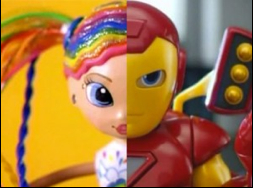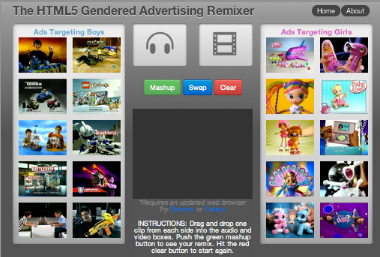BY ANDREA HOUSTON – As a young girl I was obsessed with Barbie, My Little Pony, Cabbage Patch dolls and Jem and the Holograms.
I didn’t have much interest at all in GI Joe, Tonka trucks or Transformers.

But it wasn’t until much later in life that I asked myself why.
Political remix artist Jonathan McIntosh has also pondered this question. He recently created the “Gendered Advertising Remixer” to make the gender stereotyping obvious to children, parents and educators.
“In a nutshell, the app lets you re-combine video from ads directed at boys with audio from ads directed at girls (and vice versa) to create hilarious and insightful fair use mashups. It allows you to drag and drop clips from a library of 40 different gendered toy commercials into 800 possible remix combinations,” McIntosh explains.
“Young people in the United States are subjected to an average of 25,000 TV commercials every year. Embedded in those advertisements are a very regressive and stereotypical set of social values about gender roles for boys and girls,” he writes.
Here, wise young Riley sums up gender stereotyping perfectly: “The companies that make these are trying to trick girls into buying the pink stuff instead of the stuff that boys want to buy! Why do all the girls have to buy princesses? Some girls may want superheroes; some girls like princesses. Some boys like superheroes; some boys like princesses.”

 Why you can trust Xtra
Why you can trust Xtra


